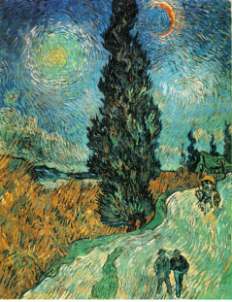


 The Cypress, in Hebrew BROSH, is one of the Biblical plants which
scholars disagree about their botanical identity. Felix identifies it
as Juniperus excelsa, while Lavie identifies it with cypress - C. Semprivens.
It is referred to in the Song of Songs (I, xvii). It is translated as
bratty in Greek (Pliny refers to it), and BERATA in Aramaic. (It is
a very common linguistic phenomenon that a SH in Hebrew is replaced
with a T in Aramaic). Like the cedar, it is a very tall tree growing
in the Lebanon Mountains. In the Talmud, there is a discussion among
the Rabbis about the various kinds and identities of shade trees, where
they distinguish between the cedar (EREZ) and cypress (BROSH). (Rosh
Hashana 23a). In most Biblical passages, the two trees are mentioned
together and in parallel, making identification even more confusing!
In Hosea, the tree is a symbol of freshness. It is impossible here to
list all the Biblical references to this popular plant. It was known
for its aromatic sap and strong odor.
The Cypress, in Hebrew BROSH, is one of the Biblical plants which
scholars disagree about their botanical identity. Felix identifies it
as Juniperus excelsa, while Lavie identifies it with cypress - C. Semprivens.
It is referred to in the Song of Songs (I, xvii). It is translated as
bratty in Greek (Pliny refers to it), and BERATA in Aramaic. (It is
a very common linguistic phenomenon that a SH in Hebrew is replaced
with a T in Aramaic). Like the cedar, it is a very tall tree growing
in the Lebanon Mountains. In the Talmud, there is a discussion among
the Rabbis about the various kinds and identities of shade trees, where
they distinguish between the cedar (EREZ) and cypress (BROSH). (Rosh
Hashana 23a). In most Biblical passages, the two trees are mentioned
together and in parallel, making identification even more confusing!
In Hosea, the tree is a symbol of freshness. It is impossible here to
list all the Biblical references to this popular plant. It was known
for its aromatic sap and strong odor.
Notes relevant to this article will go here.
-Michel Vanhove
AGORA Pages originally hosted on these now dead sites are now hosted on the AGORAIndex.org site when available:
- benzalco.com
- aromavitae
- aromatours
- FragrantDemon
Like us on Facebook at [Coming soon]
View our Twitter feed on this page.
©Aromatherapy Global Online Research Archive and it's individual authors. All Rights Reserved.